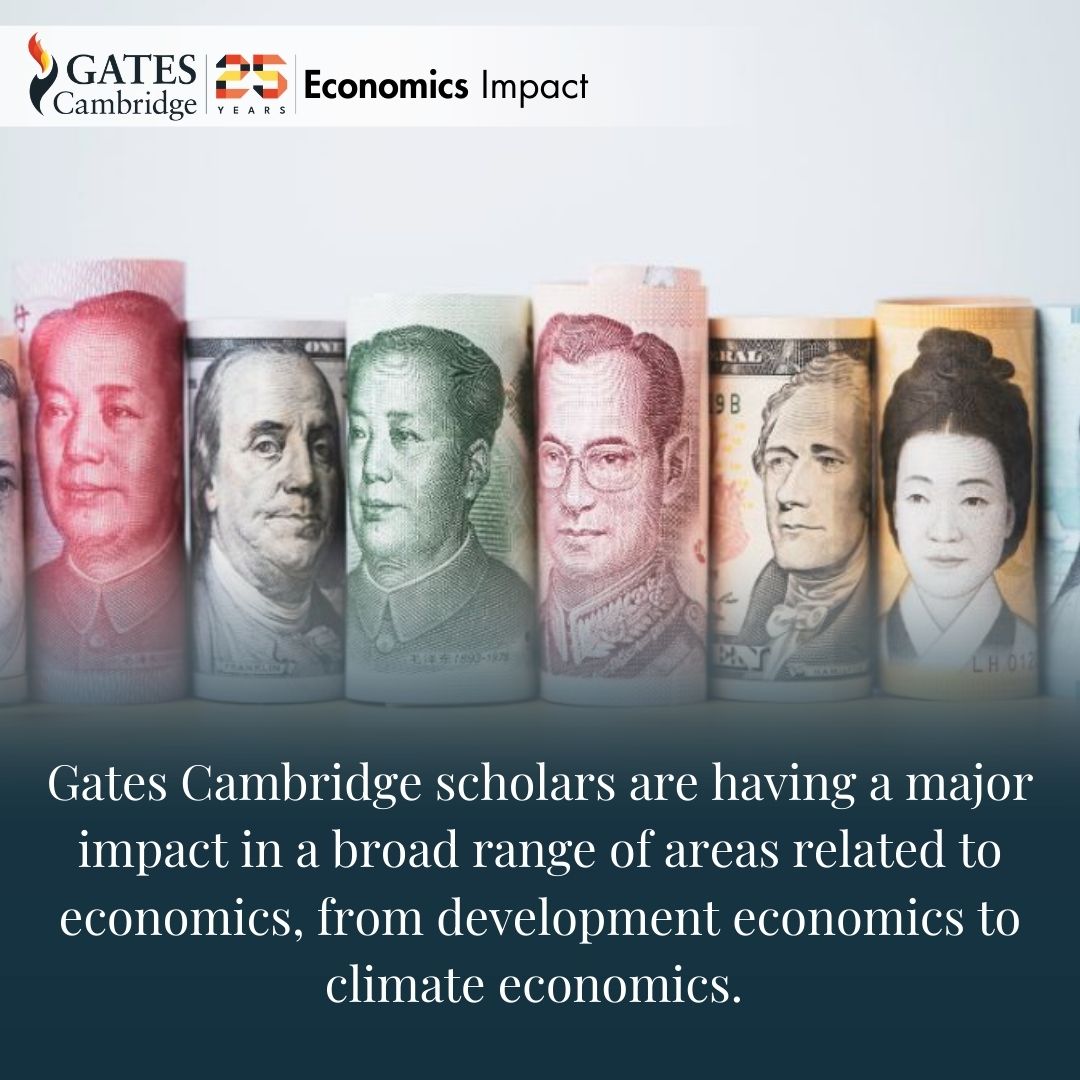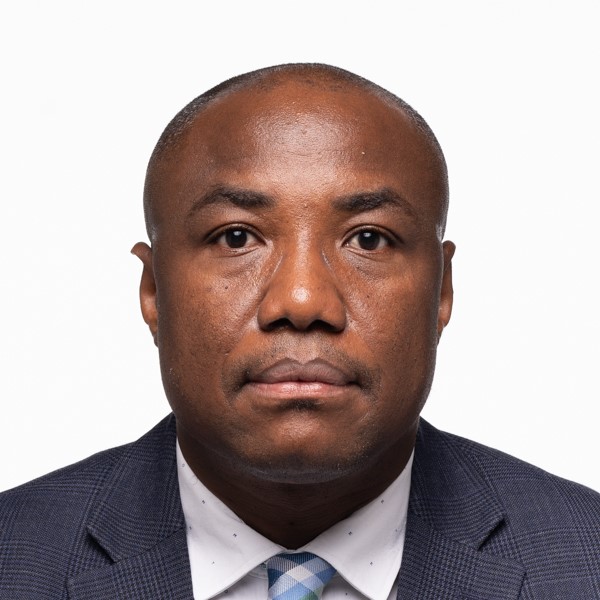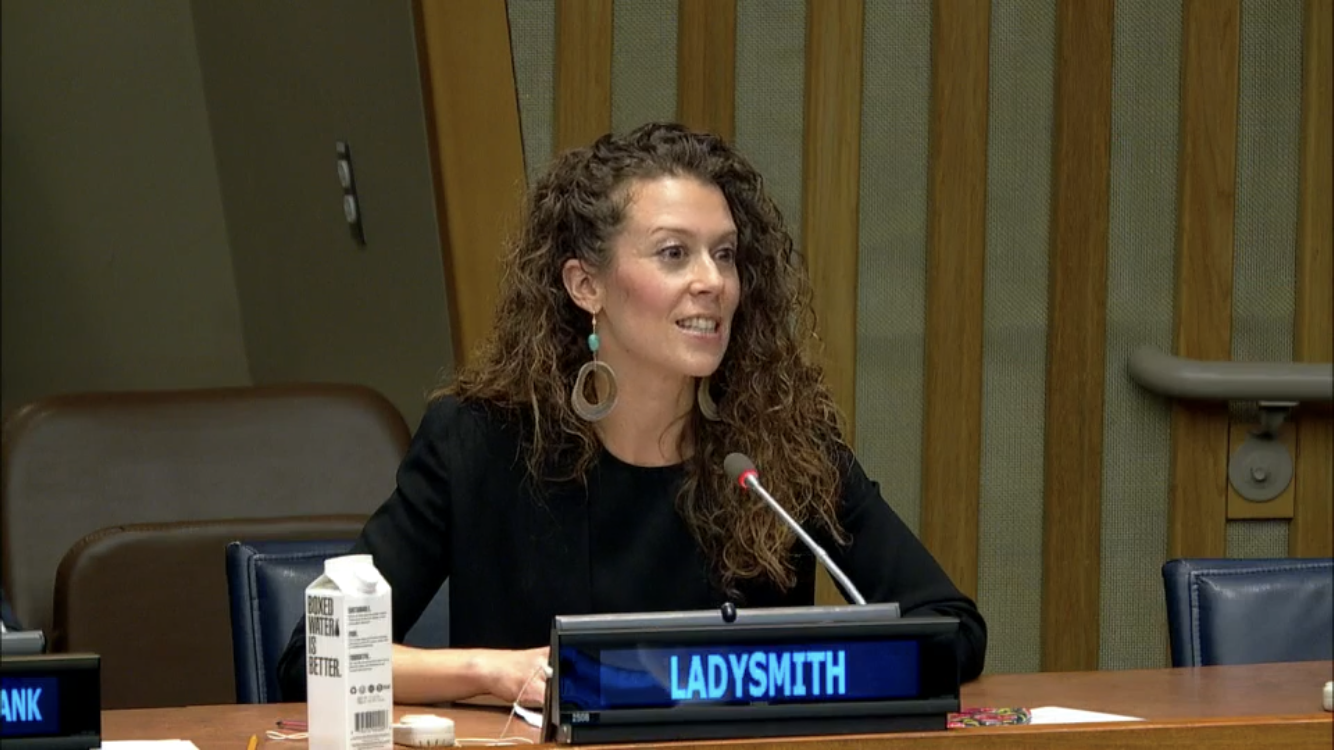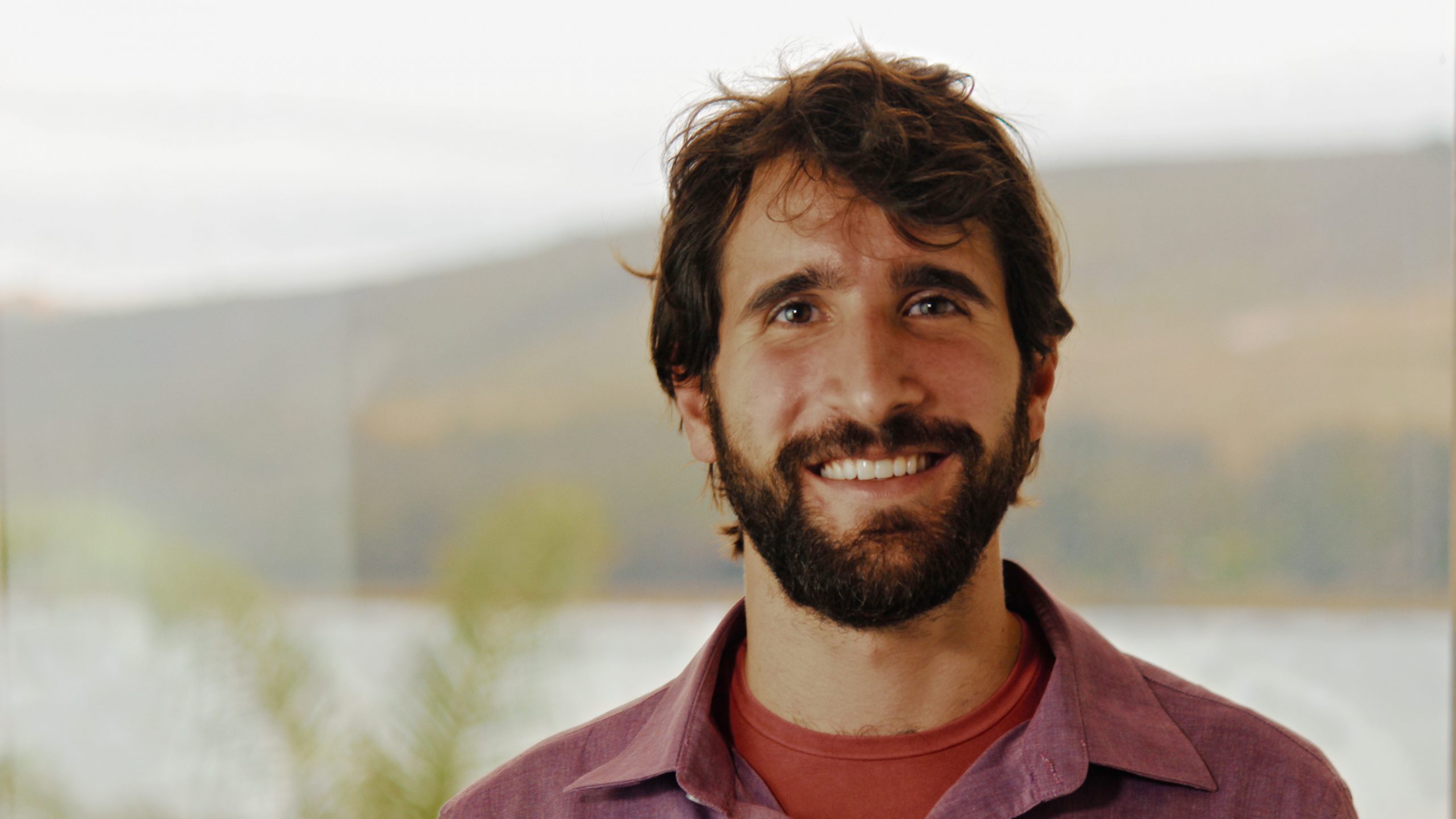
Gates Cambridge scholars are having a major impact in a broad range of areas related to economics, from development economics to climate economics.
I get very annoyed with the conventional wisdom that large companies from rich countries are inherently superior, better run, and better equipped than scrappy organisations. My book shows how the business world can learn from the innovative wit and practical ingenuity of these “ugly ducklings”. Despite some apparent clumsiness, they often persist and succeed because of their unconventional methods.
Paolo Savaget
Gates Cambridge Scholars have been active in all fields and none more so than economics, whether that be economic development, climate economics, political economy, workers’ rights, tax or the circular economy.
Economic development
When it comes to development economics, scholars have worked in a range of different international organisations as well as in academia, including the IMF, the Asian Development Bank and the World Bank.
 Charles Amo-Yartey [2002, pictured right] began working for the IMF as an intern while he was at Cambridge doing his PhD on capital market development in emerging economies. He later joined the IMF’s programme for young economists and that led to a career alternating between being a senior economist and country representative. Charles initially worked on policy advice for countries in Africa, including South Africa, Burkina Faso and Malawi before he was moved to the Western Hemisphere department where he covered Jamaica, Barbados and Suriname.
Charles Amo-Yartey [2002, pictured right] began working for the IMF as an intern while he was at Cambridge doing his PhD on capital market development in emerging economies. He later joined the IMF’s programme for young economists and that led to a career alternating between being a senior economist and country representative. Charles initially worked on policy advice for countries in Africa, including South Africa, Burkina Faso and Malawi before he was moved to the Western Hemisphere department where he covered Jamaica, Barbados and Suriname.
A decade ago, he published a book on the Caribbean region. Caribbean Renewal: Tackling Fiscal and Debt Challenges examines the problem of high debt in the Caribbean region and discusses policy options for improving debt sustainability, including fiscal consolidation, robust growth and structural reforms. It concludes that the region needs a broad and sustained package of reforms to reduce debt ratios to more manageable levels and strengthen economic resilience.
Charles says that his years of experience have taught him that, to make progress, you need the right political environment when it comes to addressing financial issues such as fiscal indiscipline.
Luca di Mario [2009] works for the Asian Development Bank. His PhD in Engineering focused on sustainable business models for turning solid waste and waste water in developing countries into a useful resource, such as energy. He is currently Senior Advisor to the Vice President for Finance and Risk Management after several years working on the ground on urban development projects in South Asia, mainly in India, the Maldives, Bangladesh and Bhutan. His first project as team leader involved establishing a sustainable regional solid waste management system, including a waste-to-energy facility, for the Greater Malé area and neighbouring outer islands in the Maldives during the Covid pandemic.
Luca states that working for a multilateral development bank like the ADB is not only about providing finance to developing countries but supporting the bank’s clients with innovative and sustainable solutions, knowledge and capacity building to address increasing development challenges, which are exacerbated by climate change.
It also means ensuring that no-one is left behind, especially the most vulnerable members of society, such as women, children, or people with a disability, and that environmental and social safeguards are met because these are critical to ensure sustainable development and poverty reduction.
Other scholars working in international development for major international organisations include Dima Krayem [2016]. Dima was until recently working as an economist for the UN office in Lebanon and before that coordinating life-saving assistance from three UN agencies – the UNHCR, the World Food Programme and UNICEF to Syrian refugees in Lebanon in the midst of the country’s economic and financial collapse.
Before doing her PhD in Development Studies at Cambridge she had worked for the World Bank, but she wanted to deepen her understanding of the specific context of the Syrian refugee presence in Lebanon, to get back out into the field to talk to those directly affected and to attempt to challenge the rhetoric of exceptionalism around the Syrian refugee influx. That work has stood her in good stead for her current role as Senior Economist at the World Bank in Lebanon.
Scholars have also been active in addressing development issues in Latin America. Cassandra Sweet [2004] is a researcher, lecturer and international consultant whose work focuses on the politics of economic development, specifically innovation systems, technological change and trade. She has worked for a range of international agencies including the UN’s Economic Commission on Latin America (CEPAL), the World Bank, the French national research agency ANRS and Latin American NGOs. Her recent projects examine pharmaceutical innovation systems, intellectual property and COVID-19 critical care supply chains in Latin America.
Queen Nworisara-Quinn [2010] has worked on African development and was an Investment Officer in the African Development Bank’s Private Sector Department. She has also served as the Bank’s Chief of Staff in the Office of the Vice President for Infrastructure & Private Sector Development. For the last few years, however, she has been focusing on innovative business models through Kupanda Capital, which invests in impactful businesses that straddle the private, public and nonprofit sectors. A founding partner of the organisation, she says: “At Kupanda Capital we see ourselves as entrepreneurs and business builders. We co-create with entrepreneurs, cultivate high performing teams and scale up pan-African companies. It’s very collaborative and not just about deploying capital. We are focused on how to build sustainable businesses in Africa.”
Women and development
 Some scholars are working on particular areas of development. They include Tara Cookson [2011, pictured left] whose work on women and development spans both academic research and activism. She co-founded the feminist research consultancy Ladysmith which works with a range of partners, including UN Women. Now Canada Research Chair in the School of Public Policy and Global Affairs at the University of British Columbia [UBC], she is working on a book on the datafication of development work and is looking at new ways of approaching development issues.
Some scholars are working on particular areas of development. They include Tara Cookson [2011, pictured left] whose work on women and development spans both academic research and activism. She co-founded the feminist research consultancy Ladysmith which works with a range of partners, including UN Women. Now Canada Research Chair in the School of Public Policy and Global Affairs at the University of British Columbia [UBC], she is working on a book on the datafication of development work and is looking at new ways of approaching development issues.
At UBC Tara, who won the Bill Gates Sr. Prize in 2014, has been working on a book project with Ladysmith colleague Lorena Fuentes on data on gender and development and how data is changing feminist practice. For the book, Tara’s research team interviewed over 100 development practitioners and rights advocates about how data is changing the way they work. She says: “Data can be a tool for feminist change, but it is not the only tool needed. It is important to recognise its limitations, when it should not be collected and what the unintended consequences might be of collecting it. The metrics you choose to measure really matter. That’s why I started Ladysmith. We needed a different, broader lens and different measurement tools to see the overall impact of programmes.”
Sharmila Parmanand [2016], Assistant Professor in Gender, Development and Globalisation at the London School of Economics, works on women in the sex industry. She is writing a book, Saving Our Sisters: The Politics of Anti-Trafficking and Sex Work in the Philippines, based on her PhD dissertation. It will argue that if governments insist on understanding sex workers exclusively as victims, that limits the scope of their interventions to ‘rescuing’ and redirecting sex workers to other forms of low-paid, insecure, feminised work, foreclosing sex workers’ political agency or rights. She will make the case for an expansive re-imagining of anti-trafficking that foregrounds social justice and equity rather than criminalisation.
Climate economics
Other Gates Cambridge scholars have a focus on climate economics, specifically the cost of not tackling climate change. Kamiar Mohaddes [2005], now Associate Professor at Cambridge Judge Business School and a Fellow in Economics at King’s College, published a groundbreaking working paper in 2019 on climate economics which found that all countries – rich or poor, hot or cold – will suffer economically under the current emissions trajectory, showed the US losing 10.5% of its GDP, and Canada over 13%, by the end of this century. That research, now updated, underpinned much of a 2021 letter to the Chair of the Federal Reserve, signed by 25 members of the United States Congress, calling for the incorporation of climate risk into monetary policy. Kamiar has recently co-founded climaTRACES lab with fellow Cambridge Gates Scholar Ramit Debnath [2018] to plug a gap in approaches to climate change. Ramit recently conducted research on how lethal heatwaves will hold back India’s economic development. Kamiar says of climaTRACES: “We want to work out how policy makers and businesses can best understand the cost of climate change and biodiversity loss. We need to take these communities with us through the right communications, and the right policy and product design.”
Political economics
There is a strong crossover between politics and economics generally and several other Gates Cambridge scholars have bridged the two topics. They include Todd Tucker [2012 ], director of Industrial Policy and Trade at the Roosevelt Institute. In 2018 Todd published Judge Knot, a book on the complex world of investor-state dispute settlement which explored how global trade and investment can be democratised. In his current role, he has given evidence to the US government on numerous occasions about economic policy, including recently when he advised the Office of the US Trade Representative on supply chain resilience in the face of supply shocks and a changing economic and climate landscape.
 Reid Lidow [2014, pictured right with Gordon Brown, Michael Spence and Mohamed El-Erian], who was previously Executive Officer to the Mayor of Los Angeles, stood for office in Los Angeles and has worked for Gordon Brown on everything from education to Brexit, recently co-authored a book with Gordon Brown, Nobel Laureate economist Michael Spence and Mohamed El-Erian, President of Queen’s College. Permacrisis: A Plan to Fix a Fractured World argues that at the heart of today’s permacrisis are broken approaches to growth, economic management and governance, but that these are not beyond repair. It explains where we’ve gone wrong, and offers a provocative, inspiring plan to do nothing less than change the world.
Reid Lidow [2014, pictured right with Gordon Brown, Michael Spence and Mohamed El-Erian], who was previously Executive Officer to the Mayor of Los Angeles, stood for office in Los Angeles and has worked for Gordon Brown on everything from education to Brexit, recently co-authored a book with Gordon Brown, Nobel Laureate economist Michael Spence and Mohamed El-Erian, President of Queen’s College. Permacrisis: A Plan to Fix a Fractured World argues that at the heart of today’s permacrisis are broken approaches to growth, economic management and governance, but that these are not beyond repair. It explains where we’ve gone wrong, and offers a provocative, inspiring plan to do nothing less than change the world.
Other scholars work as political lobbyists on economic issues such as workers’ rights. They include Agnieszka Piasna [2009], a senior researcher in the Economic, Employment and Social Policies Unit at the European Trade Union Institute [ETUI]. With a background in Sociology, Agnieszka coordinates research activities in the framework of the ETUI Internet and Platform Work Survey, develops the European Job Quality Index and carries out research on working time reduction. She has been an expert advisor to the Eurofound, the European Union’s Agency for the improvement of living and working conditions, and the European Institute for Gender Equality among other organisations.
Tax
An important focus of economics in recent years has been on tax evasion and avoidance as governments struggle to fund public services amid widening inequality. Gates Cambridge scholar Andrea Binder [2014], Research Group Leader at the Otto Suhr Institute of Political Science at Freie Universität Berlin, has done pioneering research in this area. Her 2023 book Offshore Finance and State Power investigates the complex relationship between the two. It asks how offshore financial services affect the power of the state and finds that legal offshore banking trumps tax planning or money laundering in its impact on state power.
Alternative economics
Still other scholars are looking at alternatives to mainstream economic models. Rashad Abbasov [2002] is a circular economy entrepreneur and business builder. He is CEO of Circular Route which is developing an AI-powered platform that transforms the second-hand market by supporting charities, reducing donation waste and promoting sustainability. Rashad was previously Vice President at Terracycle, where he led incubation and new business ventures, and he founded Scrapo, the world’s largest plastic recycling marketplace that connects 85,000+ businesses in 150 countries. He has won several awards, including the US Department of Energy Prize for an innovative reuse-resale solution and the Texas Environmental Leadership Award for Superior Materials Recovery.
 Meanwhile, Paolo Savaget [2015, pictured left], like many of the scholars mentioned above, shows the interdisciplinary expertise that scholars bring to economics issues. His PhD is in Engineering [with a focus on management and business] and he is currently Associate Professor at the University of Oxford, with a joint appointment between Engineering and the Business School. Paolo’s recent book Four Workarounds shows how the most valuable lessons about problem-solving can be learned from the scrappiest, poorest organisations. It draws examples from organisations dedicated to social action that have made an art form out of subverting the status quo, proving themselves adept at achieving massive wins with minimal resources. The book was translated into Japanese, Mandarin, Taiwanese
Meanwhile, Paolo Savaget [2015, pictured left], like many of the scholars mentioned above, shows the interdisciplinary expertise that scholars bring to economics issues. His PhD is in Engineering [with a focus on management and business] and he is currently Associate Professor at the University of Oxford, with a joint appointment between Engineering and the Business School. Paolo’s recent book Four Workarounds shows how the most valuable lessons about problem-solving can be learned from the scrappiest, poorest organisations. It draws examples from organisations dedicated to social action that have made an art form out of subverting the status quo, proving themselves adept at achieving massive wins with minimal resources. The book was translated into Japanese, Mandarin, Taiwanese
Mandarin, Korean and Portuguese and was chosen as one of the best business books to read in summer 2023 by the Financial Times and won the Porchlight Book Award. Paolo was also invited to give talks at several venues including the World Economic Forum Annual Meeting of the New Champions in China as a result.
He says: “I get very annoyed with the conventional wisdom that large companies from rich countries are inherently superior, better run, and better equipped than scrappy organisations. My book shows how the business world can learn from the innovative wit and practical ingenuity of these “ugly ducklings”. Despite some apparent clumsiness, they often persist and succeed because of their unconventional methods.”












